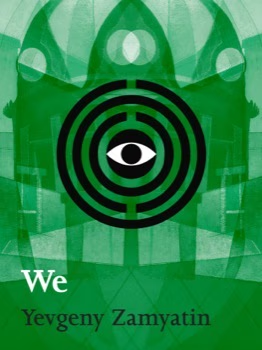Beautiful prose but no idea what it was about!
I've been collecting both recommendations and books that "we should have read" and it's really amazing to find that this book was written in the 1920s, before 1984 and A Brave New World.
The book was originally written in Russian and banned from publication for many decades. The version I've read is apparently a faithful and good translation but I do always wonder if the language has been modified or not (in one section I found a reference to electric toothbrushes - something that was invented some 30 years later).
None the less, the words to this book really are poetry.
The problem I had is that I really wasn't sure where I was in the story. The character thinks he's going insane, but he's actually discovering he has a soul, but often it did read like a madman and hallucinations.
It does end predictably, but only because I've already read the likes of 1984. I can't imagine the impact on a reader reading this back in the late 1920s. It's also worth adding that the writing really does hold up nearly a century later, which is baffling amazing.
So, great stuff for nearly 100 years old, but "just okay" because I struggled to fully follow the character.
14 Highlight(s)
If they will not understand that we are bringing them a mathematically faultless happiness, our duty will be to force them to be happy.
But, dear readers, you must think, at least a little. It helps.
when human beings still lived in the state of freedom, that is, in an unorganized primitive state.
an ancient sage once said a clever thing (accidentally, beyond doubt).
The denominator of the fraction of happiness is reduced to zero and the whole fraction is thus converted into a magnificent infiniteness.
Her voice came from there, from inside, from behind the dark window eyes, where the fireplace was blazing.
for freedom and crime are as closely related as—well, as the movement of an aero and its speed: if the speed of an aero equals zero, the aero is motionless; if human liberty is equal to zero, man does not commit any crime.
The way to rid man of criminality is to rid him of freedom.
It never occurred to me before but it is true: we who live on the earth, we are always walking over a seething red sea of fire which is hidden in the womb of the earth.
(I still insist that that I of before is the real one; my I of late is, certainly, only an illness.)
Their lyre is the morning rubbing sound of the electric toothbrushes,
Did I not populate these pages, which only recently were white quadrangular deserts,
The greatness of the "Church of the United Flock" was known to them. They knew that resignation is virtue, and pride a vice; that "We" is from "God," "I," from the devil.
Everything is so novel, so novel it is like a rainstorm, and I am not big enough to embrace it all. I spread out the folds of my unif, my palms—and yet pailfuls splash past me and only drops can reach these pages.…
